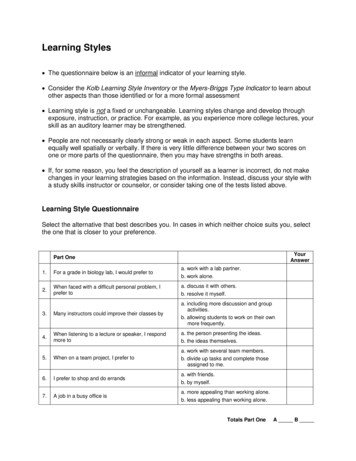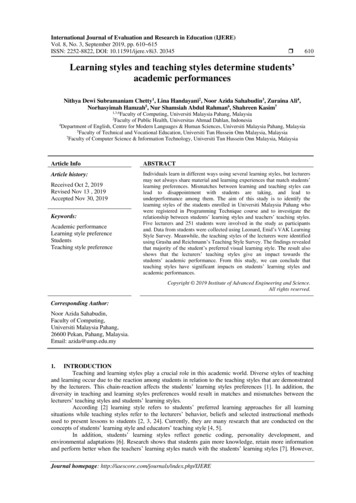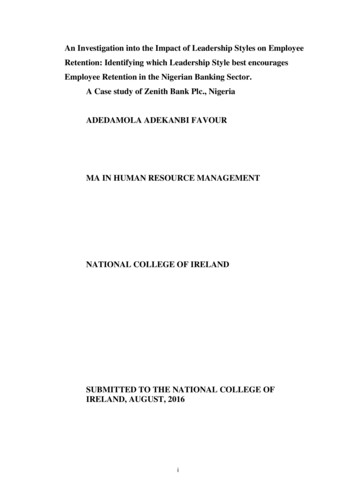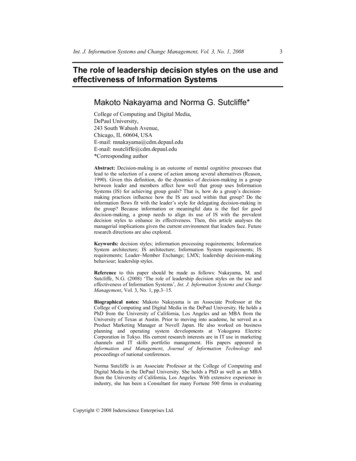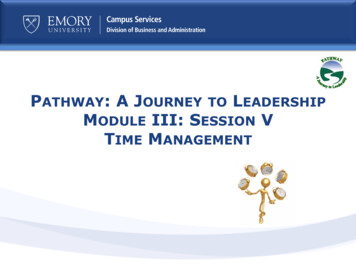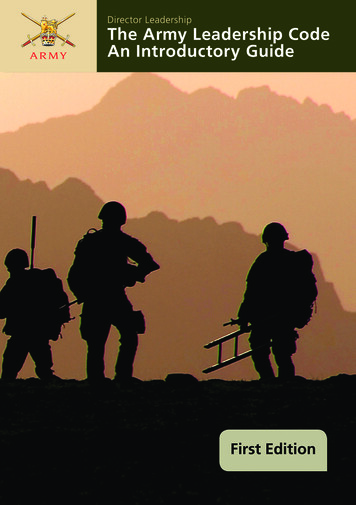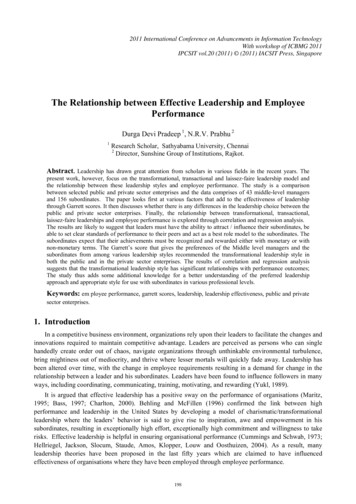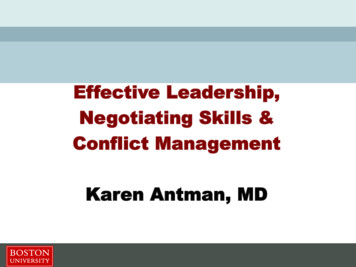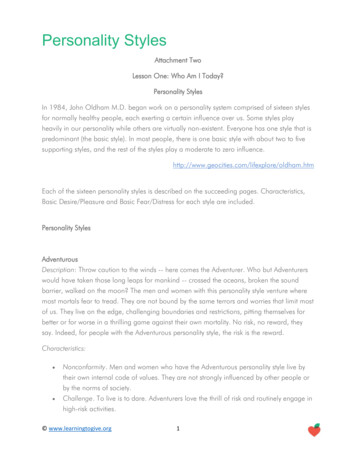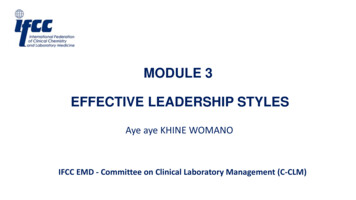
Transcription
MODULE 3EFFECTIVE LEADERSHIP STYLESAye aye KHINE WOMANOIFCC EMD - Committee on Clinical Laboratory Management (C-CLM)
CONTENTS OF THIS MODULELeadership StylesRelationships between StylesLeadership actions for Managing OrganizationsBehaviors of Successful LeadershipImproving Leadership SkillsIFCC EMD - Committee on Clinical Laboratory Management (C-CLM)
LEARNING OBJECTIVESBy completing this module, participants will be able to:Describe the different styles of leadership.Describe leadership skills and traits important forleadership success.Describe behavioral features important for effectiveleadership.List practices to improve leadership skills.IFCC EMD - Committee on Clinical Laboratory Management (C-CLM)
Leadership ionalLeadership StylesSource: Brighthub.comIFCC EMD - Committee on Clinical Laboratory Management (C-CLM)
Charismatic Leadership Use charm to get the admiration offollowers. Shows concern and they look after theirpeople's needs. Creates a comfortable and friendlyatmosphere for followers by listening andmaking them feel that they have a voice inthe decision making. Famous examples: Winston Churchill, BillClinton, Mother Teresa and Adolph HitlerIFCC EMD - Committee on Clinical Laboratory Management (C-CLM)
Democratic/Participative Leadership Usually seen in corporate settings. Act like facilitators: facilitate ideasand the sharing of information withthe end goal of arriving at adecision. The final decisionultimately rests on the leader butall considerations and factors of adecision come from the collectivemind of the group under thisleadership.IFCC EMD - Committee on Clinical Laboratory Management (C-CLM)
Democratic/Participative LeadershipNot effective when.Not used when Insufficient time for everyone’sinput Easier and more cost-effective forthe manager to make decision Can’t afford mistakes Staff safety is of critical concern ifdecision delayed to vote Personal agendas of staff conflictwith the company’s values andpolicies If the leader feels threatened bystaff Management has agenda that staffis not likely to agree withIFCC EMD - Committee on Clinical Laboratory Management (C-CLM)
Situational LeadershipCharacteristics The leader adjusts to whateverlimitation is laid out before himby subordinates and thesituation itself. Adaptability is key here. Leader needs to be as dynamicas the different situations theyare faced with.Three factors affect decisions The Situation The ability of the followers The ability of the LeaderIFCC EMD - Committee on Clinical Laboratory Management (C-CLM)
Situational LeadershipFour approaches situational leaders use to involve the staffTellingCoachingJoiningDelegatingOrganize, Explain,& MonitorConsulting &ConvincingEncourage &FacilitateFreedom to decideFor people with:For people with:For people with:For people with:Low CompetenceSome CompetenceHigh CompetenceHigh CompetenceHigh CommitmentSome CommitmentVariable CommitmentHigh CommitmentIFCC EMD - Committee on Clinical Laboratory Management (C-CLM)
Laissez-Faire Leadership An hands-off style Leader provides little or no direction and givesstaff as much freedom as possible All authority or power given to the staff andthey determine goals, make decisions andresolve problems. Useful style when team members are matureand experts in the field Weakness of style: the leader becomesdisconnected, or finds easy way out to blameteam members for problems encounteredIFCC EMD - Committee on Clinical Laboratory Management (C-CLM)
Transactional Leadership Involves establishing a clear chain ofcommand Leader motivates subordinates bypresenting rewards and punishments. All requirements for a subordinate areclearly stated with correspondingrewards. If they fail to satisfy those requirements,they will receive a correspondingpunishmentIFCC EMD - Committee on Clinical Laboratory Management (C-CLM)
Transformational Leadership Lead by motivating followers. Leaders appeal to followers' ideals andmoralstomotivatetheminaccomplishing tasks. Empower followers using their ownbeliefs and personal strengths - theyinspire their followers. Famoustransformationalleadersinclude Martin Luther King Jr. and WaltDisneyIFCC EMD - Committee on Clinical Laboratory Management (C-CLM)
The Quiet Leader Leads by example. They do not: tell people what to do. force people to do things that they are not willingto do. give loud speeches, sweeping statements and clearcut orders. They do what needs to be done, inspiring theirfollowers to do the same. Famous examples include: Rosa Parks, KingGeorge VI, Abraham Lincoln and WoodrowWilsonIFCC EMD - Committee on Clinical Laboratory Management (C-CLM)
Servant Leadership First takes care of needs offollowers first before they takecare of own needs. Leads by compulsion of theneed to serve followers ratherthan impose their own will onthem. Famous examples include:George Washington, Gandhiand MandelaIFCC EMD - Committee on Clinical Laboratory Management (C-CLM)
Relationship betweenLeadership StylesIFCC EMD - Committee on Clinical Laboratory Management (C-CLM)
Relationship betweenLeadership StylesIFCC EMD - Committee on Clinical Laboratory Management (C-CLM)IFCC EMD - Committee on Clinical Laboratory Management (C-CLM)
What are leadership skills and traits?IFCC EMD - Committee on Clinical Laboratory Management (C-CLM)
Success in Leadership Depends on:Self-management Effective leaders regulate their time, attention, andemotions, and they are familiar with their strengths,weaknesses, and sources of bias. Involves Mastering Self: Self-awareness - ability to manage own feelingsso that response to people and events areauthentic and appropriate. Self-control - involves disciplined without beingtoo reserved or inflexible. Resilience - managing stress and devoting timeto important areas of life outside work.IFCC EMD - Committee on Clinical Laboratory Management (C-CLM)
Success in Leadership Depends on:Organizational Capabilities Successful leaders know how to use power appropriately, work withinestablished procedures, and make decisions. This involves: Use of power and authority - exercising power withoutoverwhelming co-workers. Being comfortable with organizational structures - followingrules and policies — while still supporting individuality. Responsibility and accountability - owning up to your mistakesand expecting others to do the same. Decisiveness - balancing different perspectives and takingappropriate actionIFCC EMD - Committee on Clinical Laboratory Management (C-CLM)
Success in Leadership Depends on: Teambuilding and teamwork Team building requires leading or participating in groups of people withdistinct personalities, motivations, and skills. It involves: Interpersonal skill - the ability to be approachable in spite of theauthority you hold. Understanding others - being able to empathize with differentpeople's feelings. Capacity for collaboration - knowing that solving problemsrequires a variety of ideas and opinions, without getting sidetracked by conversation and debate. Working with and through others - both sharing and delegatingassignmentsIFCC EMD - Committee on Clinical Laboratory Management (C-CLM)
Success in Leadership Depends on:Problem Solving Problem solving is about managing group politics and understandingwhy people act the way they do. It involves: Creativity - challenging the status quo, even while respectingorganizational procedures. Handling sensitive problems - confronting delicate issues headon, instead of running away from them. Being action oriented - knowing when it's time to make adecision — even if you haven't gathered all the information you'dlike to haveIFCC EMD - Committee on Clinical Laboratory Management (C-CLM)
Success in Leadership Depends on:Sustaining the vision Successful leaders don't just plan their own success — they can also see thecompany's future and have concrete goals for the organization. Moreover,they consistently inspire confidence in and motivate co-workers. Sustainingthe vision requires: Self-confidence - optimism in spite of worries, and communicating thatoptimism to others. Managing change - striking balance between stability and growth andopenness to new approaches yet avoiding distraction from the maingoals. Influence - being outgoing and persuasive without being overbearing. Comfort with visibility - not freaking out when you're in the spotlighttalking about the organization's values, or when you're networking for thesake of furthering your organization's mission.IFCC EMD - Committee on Clinical Laboratory Management (C-CLM)
Other factors important to successin Leadership Conflict resolution - managing group politics and understanding whypeople act the way they do. Creativity - challenging the status quo, even while respectingorganizational procedures. Handling sensitive problems - confronting delicate issues head-on,instead of running away from them. Action orientation - knowing when it's time to make a decision —even if you haven't gathered all the information you'd like to have.IFCC EMD - Committee on Clinical Laboratory Management (C-CLM)
Motivation* and LeadershipTo become an efficient leader, one must be selfmotivated”- Know yourself, your needs and have astrong urge to do anything to achieve your goals.Once you are self-motivated, only then you canmotivate others to achieve their goals and to harmonizetheir personal goals with the common goals of theorganization.*) Read Further: Module 5 - The Leader as Visionary and MotivatorIFCC EMD - Committee on Clinical Laboratory Management (C-CLM)
Visible and HiddenChallenges in theOrganization:How behaviourcan play a role?IFCC EMD - Committee on Clinical Laboratory Management (C-CLM)
How to Improve Your Leadership Skills1.2.3.4.5.6.7.8.9.10.11.Have a clear visionKnow and utilize your strengths and gifts (critical inward reflection)Be willing to admit and learn from failures and weaknessesSet definitive goals and follow concrete action plansLive in accordance with your morals and valuesServe as a role modelBe passionateMaintain a positive attitudeImprove communication skillsMotivate others to greatnessContinue to educate and improve yourselfSource: www.investopedia.comIFCC EMD - Committee on Clinical Laboratory Management (C-CLM)
SUMMARYThere are many different styles of leadership we discussed 9 of themincluding: charismatic, participative/democratic, autocratic, Laisses-faire,autocratic, situational, transactional, transformational, servant and quietleadership can be related to in the clinical laboratory.Successful Leadership depends on several skills and traits: includingself-management, organizational capabilities, team building and teamwork, problem solving ability, and ability to sustain the organizationalvision.Humility, Professional Will, and Motivation are behaviors important toeffective leadershipIFCC EMD - Committee on Clinical Laboratory Management (C-CLM)
TASKSWhat sort of leader do you think you are?Do you feel you are an effective leader?What type of leadership do you prefer in otherswhen you are not the leader in a given situation?In what areas, if any, do you think you might needto develop as a leader?IFCC EMD - Committee on Clinical Laboratory Management (C-CLM)
Useful style when team members are mature and experts in the field Weakness of style: the leader becomes disconnected, or finds easy way out to blame team members for problems encountered . Transactional Leadership IFCC EMD - Committee on Clinical Laboratory Management (C-CLM) Involves establishing a clear chain of command Leader motivates subordinates by presenting rewards and .
